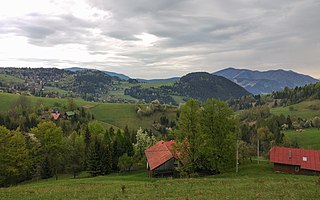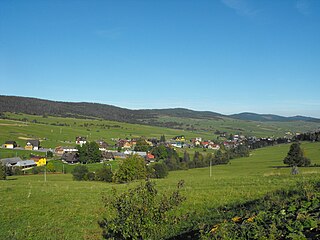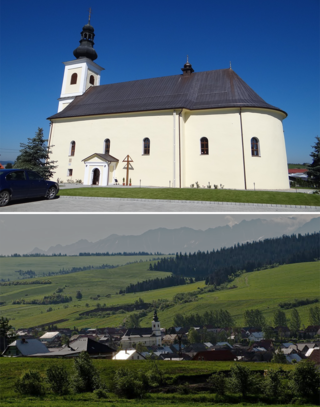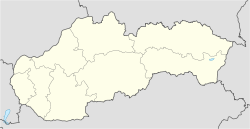
Ťapešovo is municipality (village) near Námestovo, Žilina Region, Slovakia. It is located on the Biela Orava river. The first written mention of Ťapešovo comes from 1580. In 1588 Ťapešovo was under the rule of the Orava Castle.

Donovaly is a village in the Banská Bystrica Region of central Slovakia. Being situated in an important pass between the mountains of Veľká Fatra and Starohorské vrchy, on the route connecting Banská Bystrica with Ružomberok, it became a prominent centre of winter and summer sports.
Bystrá is a village and municipality in Brezno District, in the Banská Bystrica Region of central Slovakia.
Hozelec is a village and municipality in Poprad District in the Prešov Region of northern Slovakia.

Rimavská Baňa is a village and municipality in the Rimavská Sobota District of the Banská Bystrica Region of southern Slovakia. The name of the village means Mine of the Rimava region and is a commemoration of the mining history of the region. Although mining is for some centuries not present, the village is a home to one of the nicest decorated church in the region. Protestant church from the 13th century was several times rebuilt, in its present form it has baroque features. It contains Gothic wall paintings, painted wooden matroneum from 1726 and painted wooden ceiling.

Rimavské Brezovo is a village and municipality in the Rimavská Sobota District of the Banská Bystrica Region of southern Slovakia. Among the most important sightseeings belong historical municipal house, evangelical church from 13th century and a historical mining company building. Inside the evangelical church are gothic wall paintings from 18th century.

Zázrivá is a village and municipality in Dolný Kubín District in the Žilina Region of northern Slovakia. It is located in the Orava region, around 35 km from Žilina and 20 km from Dolný Kubín. It was first mentioned in 1556.

Kraľovany is a village and municipality in Dolný Kubín District in the Žilina Region of northern Slovakia. It lies at the confluence of the Orava and Váh rivers.

Ždiar is a village and municipality in the Poprad District in the Prešov Region in Spiš in northern Slovakia.

Staré Hory is a village in the Banská Bystrica Region in Central Slovakia. It is situated in the Staré Hory Mountains, between the Veľká Fatra and Low Tatra mountain ranges. As of the end of 2019, the village had a population of 555.

Gerlachov is a village and municipality in Poprad District in the Prešov Region of northern Slovakia, under the High Tatras. It historically belongs to the Spiš region.

Stará Lesná or "Old Forest" is a village and municipality in Kežmarok District in the Prešov Region in north-central Slovakia. Stará Lesná is located in an area traditionally known as Spiš and it is situated within the Slovak Tourism Region of the Tatras.
Spišské Hanušovce is a village and municipality in Kežmarok District in the Prešov Region of north Slovakia.

Slovenská Ves is a village and municipality in Kežmarok District in the Prešov Region of north Slovakia.
Mlynica is a village and municipality in Poprad District in the Prešov Region of northern Slovakia. It lies on the foothills of High Tatras.

Vernár is a village and large municipality in Poprad District in the Prešov Region of northern Slovakia. It lies between Low Tatras and Slovenský raj mountain ranges. It is Slovakia's western-most municipality with Orthodox plurality.
Štôla is a village and small municipality in Poprad District in the Prešov Region of northern Slovakia. It lies on the foothills of High Tatras.

Čimhová is a village and municipality in Tvrdošín District in the Žilina Region of the northern Slovakia. It has over 600 inhabitants and lies on the banks of Oravica river, in the Orava Basin, near the Slovak-Polish border.
Veterná Poruba is a village and municipality in Liptovský Mikuláš District in the Žilina Region of northern Slovakia.

Podkonice is a village and municipality in Banská Bystrica District in the Banská Bystrica Region of central Slovakia.


















